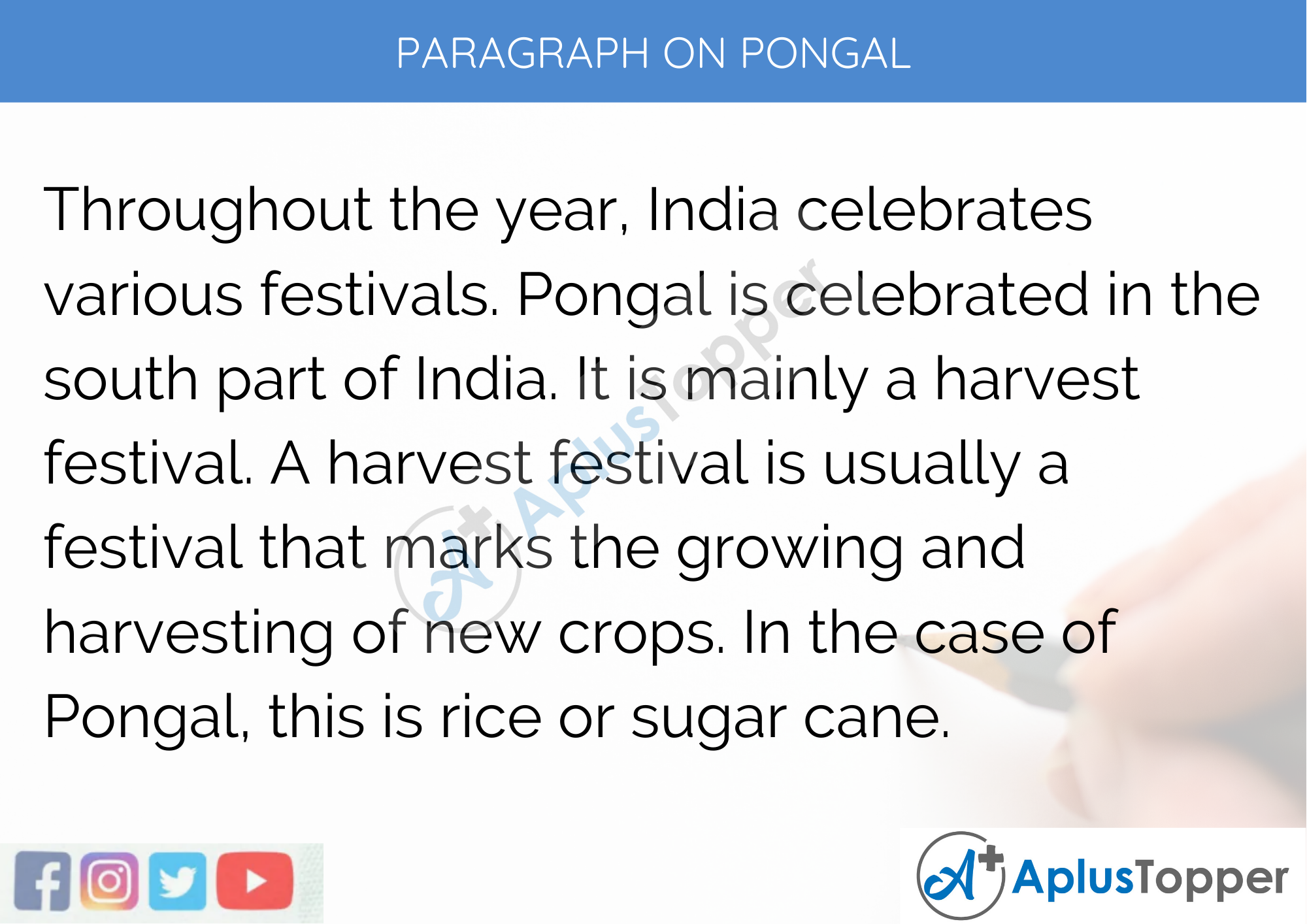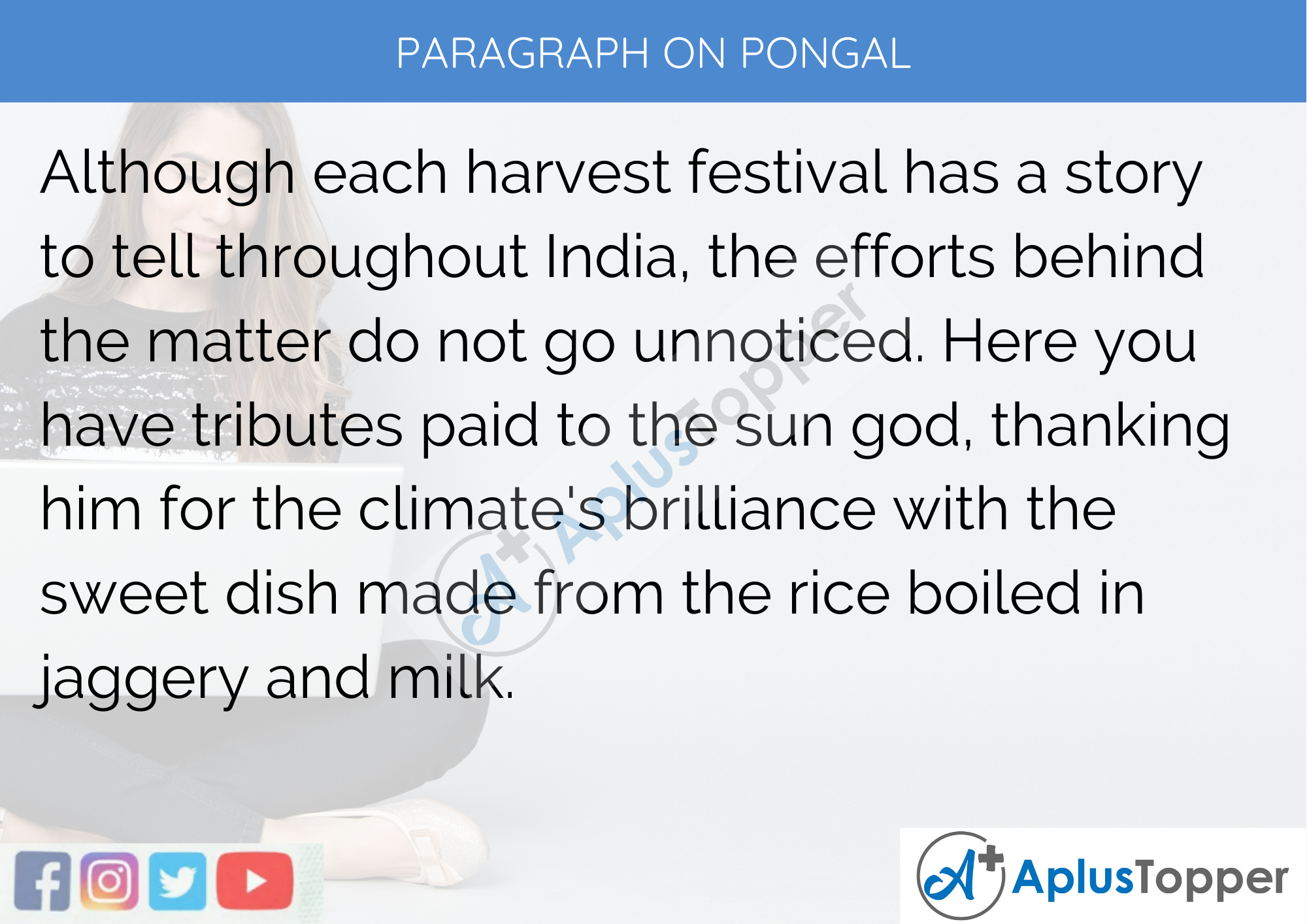Paragraph On Pongal: Pongal is a four day Hindu festival celebrated in South India. The festival is celebrated to thank the Sun God for providing nourishment to the crops throughout the year. It is celebrated in the months of January-February. Most of the festivals in India are related to nature, and Pongal is one of them.
You can read more Paragraph Writing about articles, events, people, sports, technology many more.
Paragraph On Pongal – 100 Words for Classes 1, 2, 3 Kids
Throughout the year, India celebrates various festivals. Pongal is celebrated in the south part of India. It is mainly a harvest festival. A harvest festival is usually a festival that marks the growing and harvesting of new crops. In the case of Pongal, this is rice or sugar cane.
There are usually four days to the celebration of Pongal. The festival of Pongal marks not only happiness but also prosperity. Pongal harvest festivals exist in different parts of India. This shows the uniqueness of our activities connected by one single theme. Pongal is, therefore, a festival of much joy, hope, and happiness.

Paragraph On Pongal – 150 Words for Classes 4, 5 Children
When India and her celebrations are talked about, there is a single point that goes without mentioning, and that is unity in diversity. The festivals across India are a mark of the feature of unity in diversity. Across the whole of India, that time of harvest is important economically and culturally and socially. This is why different parts of India have different harvest festivals.
The festival of Pongal is a cultural product that marks the prosperity that comes in the harvest. Celebrating freshly harvested crops can appear weird to the world, but for a country like India, it is more than important. Pongal spread over three days, and each day has it’s name-bhogi, surya, mattu. Interestingly, Pongal, as much as a festival, also includes the preparation of a sweet dish called Pongal prepared with freshly harvested rice as a sweet dish.
Paragraph On Pongal – 200 Words for Classes 6, 7, 8 Students
India, the land of festivals, is also an agricultural economy. The festivals related to the harvest season occupy a completely different place in the hearts of those who celebrate it. Villages who are associated with agriculture primarily are the ones for whom Pongal is meant to be technical. But then there is a sense of dedication to God and his benevolence for giving the agricultural season with perfect blends of sunshine and rain. Pongal means to boil over in Tamil.
This relates to the sweet dish that is prepared out of the freshly harvested rice that is boiled in jaggery and milk and served to the Gods. Pongal should not just be looked at as a festival that celebrates culture and prosperity but also as something that validates the hard work of those who work tirelessly to provide the food for the entire country.
In Pongal, therefore, we find not only religious meaning but also adequate reverence too. It is widely believed that the festival associates with the sun God Surya, but it reflects strength and determination. India celebrates the spirit of being united and diverse at the same time. Pongal is one such aspect that highlights the same. The commonness of the economy balanced by religion and culture makes Pongal an expression of what drives every community across the entire country.
Paragraph On Pongal – 250 to 300 Words for Classes 9, 10, 11, 12 And Competitive Exams Students
Pongal, the harvest festival of the southern part of India, binds together the community of those who work day and night for the entire nation. And it is not just Pongal or Bihu or Makar Sankranti for that matter.
Although each harvest festival has a story to tell throughout India, the efforts behind the matter do not go unnoticed. Here you have tributes paid to the sun god, thanking him for the climate’s brilliance with the sweet dish made from the rice boiled in jaggery and milk.
However, what cannot be dismissed behind the celebration of Pongal is the idea that sustains it. To think about a community of people coming together for the sake and growth of a fresh harvest is not the only issue here. The ties within the community that add to the spirit and essence of Pongal also is a matter of importance. The soil, the sun, the rains, and the plow are all the essential elements that make Pongal spiritually what it is, as it gets spread over three consecutive days. Pongal is not just about festivity and celebration of harvest but that of belief and culture too.
The perspective of such festivals in India shows the strength of the country’s association with religion, culture, and humanity above everything. The fact that one can distinguish them from their nature and character does not give ground for multiple meanings or deep divisions. As long as humanity and humanism survive, Pongal will continue to speak widely through its celebration of the message of togetherness and unity.
Read More: My village Paragraph

FAQ’s on Paragraph on Pongal
Question 1.
What does the word Pongal mean?
Answer:
The word Pongal means to boil over in Tamil. It is the name of the sweet dish made of the freshly harvested rice by boiling it in jaggery and milk and served to the Gods.
Question 2.
What are the four days of Pongal?
Answer:
The four days of Pongal are bhogi, surya, mattu, and kannum.
Question 3.
What is the essence of Pongal as a festival?
Answer:
Pongal as a festival is a celebration of prosperity that is marked by the harvest. The essence of it lies the community ties fostered by it, which includes the effort and hard work of agricultural workers.
Question 4.
Who is Pongal dedicated to?
Answer:
The festival of Pongal is dedicated to the Sun God Surya for his benevolence in making the prosperity happen.
